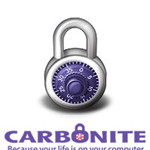Tag: RightNow Technologies
Carbonite: Cloud-based Backup Leader
 Data backup, storage, and recovery systems, once affordable for only the largest corporations and elite government agencies, are now accessible to mid-sized corporations, small businesses, and every day PC users. The sea change has occurred largely as a result of falling storage costs. Six years ago, the storage cost per gigabyte (GB) was $10.00. The price fell to $4 per GB in 2008, and to $2 per GB in 2011, according to data gathered by IDC. As an insurance policy against hard drive failure, accident, and theft, low priced hard-drives, flash drives and discs have become common for consumer and small business data back up.
Data backup, storage, and recovery systems, once affordable for only the largest corporations and elite government agencies, are now accessible to mid-sized corporations, small businesses, and every day PC users. The sea change has occurred largely as a result of falling storage costs. Six years ago, the storage cost per gigabyte (GB) was $10.00. The price fell to $4 per GB in 2008, and to $2 per GB in 2011, according to data gathered by IDC. As an insurance policy against hard drive failure, accident, and theft, low priced hard-drives, flash drives and discs have become common for consumer and small business data back up.
The falling cost of storage has made it compelling for consumers to store more data on their computers, including storage intensive media, such as pictures and videos. At the same time, the proliferation of mobile computers, including laptops, notebooks, netbooks and tablet computers, coupled with smart phones have created a need for more frequent backup, as the probability of loss or theft has risen significantly. 247 million laptop, notebook and netbook computers were shipped around the world in 2010, along with 146 million desktop PCs, according to market researcher IDC. Tablet PCs have quickly arisen to contribute another 10 million –plus units annually.
The rising use of the internet for all things digital, and the increasing trust that consumers and small businesses place in cloud computing, with its data encryption technologies and storage on remote servers located in often far away data centers, has created a new market for data backup, based in the cloud, and accessible at an affordable price.
Carbonite’s initial focus and by far the lion’s share of revenue that drives the business today is the home-based Windows and Mac market, where consumers pay a nominal $59 per year fee for an insurance policy against the aforementioned risks. Competition is widespread in this market, with some companies offering free storage, or storage bundled with other products. Nevertheless, Carbonite has developed a series of competitive advantages based on its brand awareness, which emphasizes trust, as well as its technology infrastructure, and, thus far, management execution.
Carbonite has many competitors in both the consumer and small business segments, as the barriers to entry to the market are quite low. However, just like in the early days of cloud-based salesforce automation, when Salesforce.com amassed a large market position based on the simplicity of its solution, combined with strong sales and marketing, so too does Carbonite have the opportunity to gain share in its addressable market, despite the existence of many competitors at this stage of the market’s development.
In the consumer market, Carbonite faces competition from a large number of little known players, as well as large behemoths, that have seized upon data storage as a way to keep customers in the fold. Thus, Apple, through its iCloud service, Microsoft, through its SkyDrive service, and Amazon.com, for its Kindle Fire tablets, is bundling free storage services with their products. While this poses a threat to Carbonite’s rate of growth, the company’s affordable, easy to access service, which emphasizes backup and restore –not just storage—across multiple computer platforms, should enable the company to achieve solid growth.
In the small business market, competitors include Symantec, McAfee (now a division of Intel). Both companies bundle backup and restore capabilities into their security software suites, but the products are not easily accessed, and are often difficult to use. EMC’s Mozy division delivers cloud-based backup, and currently serves over 70,000 small businesses through its subscription-based services. While EMC has made more than a symbolic entry into the cloud-based backup and storage market, the company continues to derive the lion’s share of its sales from large disk storage systems which it sells to large corporate customers that utilize their own data centers, rather than harness storage in the cloud. Rackspace Hosting also competes in the market, and other competitors include Dropbox, Box, CommVault, Databarracks, and Zamanda.
With its new $229 and $599 small business backup service, Carbonite will be quite competitive with other small business offerings on the market, including those offered by Mozy, Backblaze, and DropBox. The Carbonite offerings will be anywhere from 20 to 75 percent less than equivalently packaged configurations from these competitors, based on current prices.
Old School Software Company Seeks Cloud Entry
![]() In a brief but crystal clear announcement Monday morning, old school software giant Oracle (NASDAQ: ORCL) announced that it would acquire customer service software pioneer RightNow Technologies (NASDAQ: RNOW) for $43.00 per share or roughly $1.5 billion. Oracle’s generous valuation of 6.6 times RNOW’s projected 2011 revenue provides the latest evidence of old school, client software companies’ interest in cloud computing.
In a brief but crystal clear announcement Monday morning, old school software giant Oracle (NASDAQ: ORCL) announced that it would acquire customer service software pioneer RightNow Technologies (NASDAQ: RNOW) for $43.00 per share or roughly $1.5 billion. Oracle’s generous valuation of 6.6 times RNOW’s projected 2011 revenue provides the latest evidence of old school, client software companies’ interest in cloud computing.
Founded by CEO Greg Gianforte in 1997, and based in Bozeman Montana, RightNow Technologies sells a suite of software products that help companies improve customer service, while reducing support costs. From its heritage in website customer support, RNOW expanded into several adjacent segments, including marketing automation, call center management, online chat, and, most recently, social computing for customer service. With an average order size of about $100,000 per customer per contract, RightNow provides hosted, or what is more commonly referred to as cloud-based services for its customers. Thus, there is no need to purchase the software outright.
Over the years, RightNow has developed a solid presence in online customer service, a critical component of customer relationship management, and can now boast the leading market position in this segment. The company serves a broad array of roughly 2,000 customers.
In November of 2010 RNOW closed a $170 million convertible debt offering, and, more recently completed the acquisition of Q-Go.com, a Dutch-based company, for which it paid $34 million. Q-Go.com offers natural language search technology that helps large banks, travel services, and telecommunications companies improve the quality of customer service on their websites.
Ironically, Right Now began fourteen years ago as a client server software company, selling on premises perpetual license software. Several years ago the company began a painful and courageous transition to adapt its core technology to harness the many benefits of cloud computing. Over the last two years, RNOW managed to grow steadily and predictably, with a top-line growth rate of roughly 20 percent, across a broad number of industries.
Oracle’s generous valuation of 6.6 times RNOW’s projected 2011 revenue, and roughly 5.4 times projected 2012 revenue, indicates the length to which client server software companies may go to improve their prospects in the public cloud. The valuation appears to be on par with other publicly-traded cloud-based software companies, such as Salesforce.com (NYSE: CRM) , athenahealth (NASDAQ: ATHN), SuccessFactors (NASDAQ: SFSF), and others.
We do not doubt that there may have been other interested bidders for RNOW, such as Salesforce.com and/or SAP—both of whom seek to extend their presence in cloud computing. However, our sense is that Oracle’s generous offer leaves little chance for an alternative bidder to emerge successfully.
